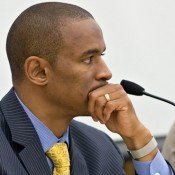Tuesday, June 16, 2009
The city of Jackson has not reached an agreement with the Jackson Police Officers Association regarding limiting the number of officers allowed to complete the sergeant's exam processcontrary to what Interim Police Chief Tyrone Lewis said at a June 11 Civil Service Commission meeting. Union president Juan Cloy denied Lewis' statement before the Commission last week, saying that the chief was mistaken.
Officers complained during Thursday's Commission meeting that the sergeants' exam organizers restricted them from completing the testing process, which includes a written test, a scenario-based examination and an individual interview. The city limited the number of officers who could move into the second and third phases of the test to officers scoring in the top 60 percent on the written testa change from the traditional process of calculating written scores alongside the scenario and interview portions of the test for a cumulative score.
Lewis told The Clarion-Ledger Thursday that the police union virtually blessed the 60-percent guideline: "The recommendation to cut off who would proceed after the written test at the top 60 was made by the police union last year, Lewis said.
Cloy said the union agreed to no parameters regarding the exam.
"Chief Lewis was mistaken in saying what he did in The Clarion-Ledger, because the union had no say in how many officers were moved onto the next stage of the test," Cloy said. "The union had several ideas about the test that the administration did not take into hand and we definitely did not have any say in how many people were moved on to the next phase."
The city has not offered a sergeant's examination since 2002, primarily because of budget issues. The city must hire a private contractor to administer the test and then must commit to pay raises for officers who get promoted after completing the process.
Cloy said he suspected the decision to limit applicants into the second and third phases of the test was also due to "money issues."
The Clarion-Ledger reported that attorney Dale Danks, who represents some of the officers, told the commission that the decision "appears to have been made by a combination of police department echelon and the Civil Service Commission," but was primarily pushed by Sampson & Co., the consulting firm that administers the test. Sources inside the city claim the city passively allowed Sampson & Co. to proceed on its own recommendations with little follow-up, even though city leaders, like Lewis, personally back applicants proceeding to the following phases of the test.
"My opinion is that the ones who passed the written exam be allowed to continue the process along with the others," Lewis told the Jackson Free Press, minutes after officers voiced their complaints to the commission. "We would like to see the process continue."
Cloy said each officer who took the test was aware of the 60 percent cut-off.
"Each one of them who went in there and took that test knew that the cut-off was 60. They had ample time, since November in 2008, to complain that the cut-off number should have been higher. They could have stopped the test," Cloy said, adding that the union's "main focus" was for the city to get on with conducting the test, "not the dynamics of the thing."
Det. Reginald Cooper, the vice president of the police officers association, took an even stronger stance on the 13 complaints.
"Morale in the department is extremely low. The last time they offered this exam was in 2002. We don't want to be here seven years later trying to take this test again. I've personally been here 10 years, and I don't want to be in my 17th year seeing the sergeant's exam," Cooper said. "Right now in the department, there is no ranking structure; no chance of corporal, no captainthere's nothing other than you getting a 10th year."
Cooper added that veteran officers are finding themselves shackled with more duties, even without official promotions and the accompanying pay increases.
"In my position, I serve as a detective, which should be a promotion from a regular patrol officer. But there is no promotion, so it's more like a lateral transfer, only without additional pay" Cooper said.
JPD has roughly 25 sergeant positions available but about 180 officers shooting for a promotion through the sergeant's exam this year. "We don't need to wait anther seven years to have a sergeant's exam, or you'll have another 200 officers taking the exam again, but you'll only have room for 20 promotions," Cooper said.
Commission members did not make a decision at Thursday's meeting. Assistant Chief Lee Vance said the next step in the issue is left utterly to the commission, however.
"Whatever decisions are made, the authority lies with the Civil Service Commission," he said. "They have the authority to either approve or disapprove of the process and we respect that authority. Our only wish is for the process to move forward as quickly as possible.

Comments
Use the comment form below to begin a discussion about this content.
Sign in to comment
Or login with:
OpenID